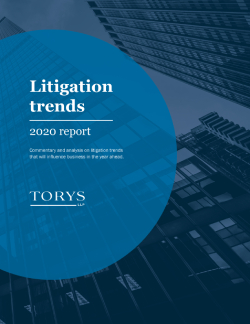Report: Litigation trends 2020
What key developments in 2020 litigation will affect businesses in the year ahead?
Download Litigation trends 2020 report
Executive Summary
This year, the courts in Canada have been forced to innovate, not only in the administration of justice, but in addressing business disputes facing unprecedented commercial realities. Several themes coming out of 2020 case law developments will have implications for businesses going forward.
Recent U.S. litigation suggests that management oversight failures and inadequate disclosures are two dominant themes set to influence Canadian litigation. A rise in investor class actions in the U.S. in response to cybersecurity incidents means senior management will want to ensure their cybersecurity governance is effective in mitigating business vulnerabilities. Canadian boards will also want to examine their oversight of international operations given the U.S. trend of Caremark claims alleging significant failure of risk management of overseas operations.
The pandemic has drawn greater attention to the importance of company disclosures of risks as well as related opportunities. Securities issuers should think carefully about public disclosure of the impacts of the pandemic as the risk of class action litigation has heightened. Meanwhile class action law is changing, which will influence case strategy for litigators, including in securities and product liability matters. As Ontario becomes less class action friendly, other provinces may witness more filings.
Litigation strategists contemplating an appeal to the Supreme Court of Canada will want to consider if they have the right matrix of factors to win. And in the area of intellectual property, a new approach may be emerging to attack divisional patents.
Business claims are further setting the tone for 2021. In Québec, commercial litigation is facing its own unique challenges, while the SCC’s recent Maple Leaf Foods ruling reminds businesses of the importance of comprehensive contracts to best guard against tort liability. Businesses should also keep close watch on the regulators: from their increased focus on competition among “digital giants” and in the telecom markets, to investor protection issues and new measures addressing the pandemic’s impact, change is on the horizon.
To discuss these issues, please contact the author(s).
This publication is a general discussion of certain legal and related developments and should not be relied upon as legal advice. If you require legal advice, we would be pleased to discuss the issues in this publication with you, in the context of your particular circumstances.
For permission to republish this or any other publication, contact Richard Coombs.
© 2026 by Torys LLP.
All rights reserved.
